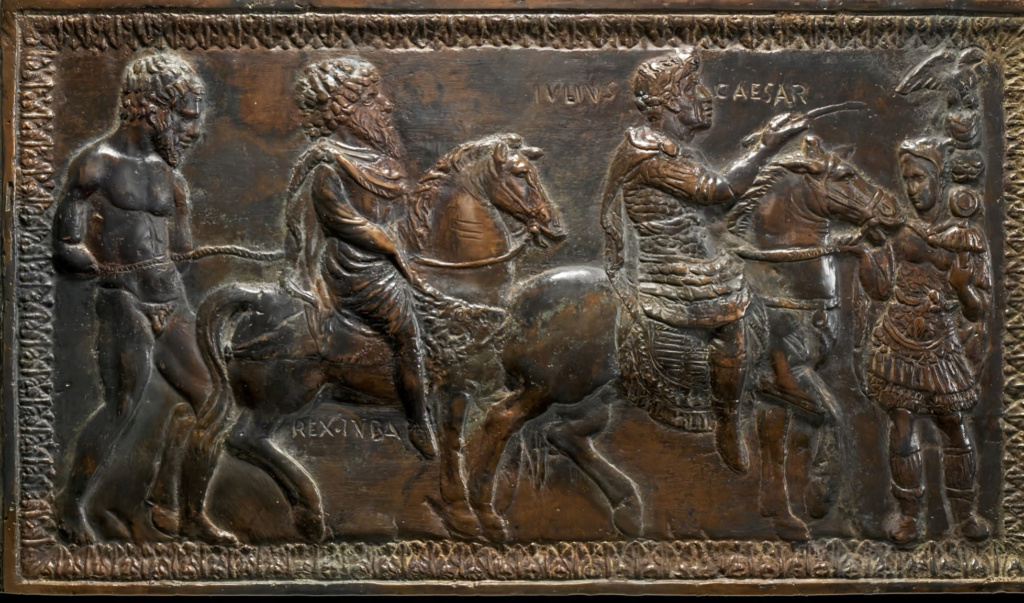A mural depicting the reign of Julius Caesar and the defeat of the Numidian king Juba I.

A mural depicting the reign of Julius Caesar and the defeat of the Numidian king Juba I. Note carefully, although it depicts a defeated and defeated person, our grandfather chose an honorable death by dueling with the enemy on the battlefield and with honor instead of being taken as a humiliated prisoner to Rome:
Written on it is Rex ivba King Yuba
Juba I (85–46 BC) was the last king of Numidia (r. 60–46 BC). He succeeded his father, King Himsal II. He is the father of Yuba II, King of Mauritania. He is a descendant of King Messenisa (d. 148 BC).
Yuba inherited the rule of his father, Hempsal II, and maintained his policy, method of administration, administration, and administration until his death in 46 BC. M. Juba I is considered the last independent Numidian king, after which Numidia will become a colony province directly subordinate to the Roman government.
In any case, Juba I lived through the Italian Civil War, which was raging in the streets of Rome, especially between the two great Roman leaders: “Julius Caesar” and “Pompeius” in order to seize power. It was necessary for the Amazigh kings in North Africa to determine their loyalty to one of these two leaders, and to ally with one against the other.
And to provide him with all material, moral, human, and military assistance so that they can maintain their kingship in Numidia, and benefit from rewards, gifts, privileges, and seizing the kingdoms of their neighbors. Moreover, they had to defend their kingdoms against Roman invaders; Because the Latin forces are gathered in several border and military centers, and the commander has mobilized their crowds, organized into several legions trained in the latest iron weapons, and organized with the best military organization in the world in that period of ancient history, and fortified in a solid way in the castles and ports of North Africa, monitoring all the movements of the Numidian kingdoms. And Mauritania carefully and planned, waiting for the opportunity to pounce on the kings of Numidia to torture them and bring them down, either in humiliation and captivity, or in ruin and destruction.
In the midst of this civil war that broke out between these two great leaders, “Yuba I” agreed to ally himself with the leader Pompey and his friend, King “Masinissa II.” Because he knew in advance Julius Caesar's hidden and declared intentions and ambitions in North Africa, his tyrannical way in managing the North African region, and his use of severity and cruelty in managing the kingdoms of this region. Therefore, King Yuba I refused to ally with Caesar of Rome, neither for security nor from afar, while the two Mauritanian kings Bougoud II and Bugos II chose to ally with Julius Caesar out of greed for privileges and fear of the oppression of Julius Caesar, the arrogant king.
The victory was ultimately for the Caesarians at the expense of Commander Pompey, who was defeated by the Caesarian forces allied with the powerful Berber forces. Before that, the Caesarian Roman forces had agreed to a quick landing in Tunisia at Ras Bon in the year 49 BC, and besieged the city of Utica, which was only liberated by King Juba I. This wonderful work won the admiration and great satisfaction of the Roman commander Pompey. He encouraged him to continue fighting until his last breath. However, the Tsarist forces will land their passengers and unload their equipment again on the shores of Africa. Consequently, Caesar's legions will besiege the forces of Juba I from all sides, supported by the Numidian army. “Yuba I” was forced to retreat towards his capital, Bonne Annaba, but he was not satisfied with fleeing and retreating. He chose an honorable death by dueling with the enemy on the battlefield and with honor, instead of being taken as a humiliated prisoner to Rome.
This period was called in ancient history the Age of Beauty, the signs of which appeared during the hundred years that preceded AD. Specifically in the year 46 BC during the Battle of Thapsus (Ras Al-Dimas); Which took place between Julius Caesar of Rome and the Numidian king Juba I; who allied himself with Caesar's arch-rival Pompey (Pompey). Accordingly, the Allied War broke out in 48 BC in North Africa, in which the forces of Yuba I participated with the forces of Pompey and the forces of Masinissa II, but they were defeated horribly by the Triple Alliance, which consisted of Caesar's army and the army of Bogod II. Yuba's forces were subjected to terrible destruction, and his kingdom suffered massive destruction and devastation. Yuba I was able to escape after he found himself alone in the battle with a few of his army, exhausted by the intensity of the fierce confrontation and staunch resistance.
Source: websites

